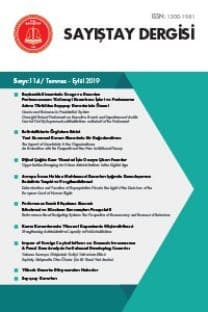ORTALAMA DENEYİM SÜRESİ, YERİNDE DENETİM SÜRESİ VE EKİP ÇALIŞMASININ MALİ TABLOLARDA TESPİT EDİLEN HATALARIN BÜYÜKLÜĞÜ ÜZERİNDEKİ ETKİSİ: SAYIŞTAY TARAFINDAN KAMU İDARELERİNİN MALİ DENETİMİ ÜZERİNE BİR UYGULAMA
Bu çalışmanın amacı, kamu kurumlarının mali denetimi sırasında tespit edilen mali tablo hatalarının bütçe büyüklüğüne oranını etkileyen değişkenlerin ağırlıklarını değerlendirmektir. Bilindiği üzere, denetim görevlerinin yerine getirilmesi ve denetim görüşünün oluşturulmasında önemli etkiye sahip birçok faktör vardır. Bunlardan en önemlileri “denetim ekibindeki denetçi sayısı”, “yerinde denetim süresi” ve “ekipteki denetçilerin ortalama deneyim süresi” olarak sıralanabilir. Bu faktörler, denetimden beklenen sonuçlarla, bir başka ifadeyle denetim çalışmasının performansıyla yakından ilişkilidir. Bu çalışmada Türk Sayıştayının 2011 ve 2012 yıllarında yaptığı denetimlerin sonuçlarından yararlanılmıştır. Çalışmadan çıkan sonuçlara göre ilk olarak; denetim ekibindeki denetçi sayısı ve tespit edilen mali tablo hatalarının bütçe büyüklüğüne oranı arasında anlamlı bir ilişki olmadığı görülmüştür. İkinci olarak; yerinde denetim süresi ve tespit edilen mali tablo hatalarının bütçe büyüklüğüne oranı arasında anlamlı bir ilişki olduğu görülmüştür. Üçüncü ve son olarak; ekipteki denetçilerin ortalama deneyim süresi ve tespit edilen mali tablo hatalarının bütçe büyüklüğüne oranı arasında anlamlı bir ilişki bulunmuştur
Anahtar Kelimeler:
Mali tablo hatası, Denetlenen kurumun bütçe büyüklüğü, Denetim ekibindeki denetçi sayısı, Yerinde denetim süresi, Ortalama deneyim süresi
THE IMPACT OF AVERAGE DURATION OF EXPERIENCE, DURATION OF ON-SITE AUDIT AND TEAM WORK ON MAGNITUDE OF ERRORS DETECTED IN FINANCIAL STATEMENTS: AN APPLICATION ON FINANCIAL AUDIT OF PUBLIC ADMINISTRATIONS BY THE TCA
The purpose of this study is to evaluate the weight of the variables that affect the ratio of the financial statement errors detected during financial audit of public institutions to the budget size. As is known, there are several factors that have significant impact on implementation of audit tasks and forming audit opinions. The most important ones are “the number of auditors in the audit team”, “the duration of on-site audit” and “average years of experience of the auditors in the audit team”. These factors are closely associated with the expected audit results; in other words with the performance of the audit work. In this study, we drew on the results of the audits that were carried out by the Turkish Court of Accounts TCA in the years 2011 and 2012. The first result of the study indicates that there is no relationship between the number of auditors in the audit team and the ratio of the detected financial statement errors to the budget size. Secondly, it is found that there is a meaningful relationship between the duration of on-site audits and the ratio of financial statement errors to the budget size. Finally, the third and last finding indicates that there is a meaningful relationship between the average years of experience of the auditors and the ratio of the financial statement errors to the budget size
Keywords:
Financial statement error, the budget size of the audited institution, the number of auditors in the audit team, Duration of on-site audit, Average years of experience,
___
- Abdolmohammadi, Mohammad and Wright, Arnold (1987), “An Examination of the Effects of Experience and Task Complexity on Audit Judgments”, The Accounting Review, Vol. LXII, No. 1, January.
- Adams, Nancy H. (1999), “Never Audit Alone”, The Case For Audit Teams, Quality Assurance, 7, pp. 195-200.
- Altıntaş, Abdullah ve Türkyener, C. Mustafa (2012), “Kamu Yönetiminde Dönüşüm ve Sayıştay Mali Denetimi”, Ankara Yayınevi, Mart.
- Bamber, E. Michael (1983), “Expert Judgment in the Audit Team: A Source Reliability Approach”, Journal of Accounting Research Vol. 21 No. 2, Autumn.
- Bonner, Sarah E., and Walker, Paul L. (1994), “The Effects of Instruction and Experience on the Acquisition of Auditing Knowledge”, The Accounting Rewiev, Vol:69, No:1 , January.
- Bonner, Sarah E. (1990), “Experience Effects in Auditing: The Role of Task-Specific Knowledge”, The Accounting Review, Vol. 65. No. 1, January, pp. 72-92.
- Cahill, Lawrance B. (2007a), “EHS Audit Guidance: Audit Preparation”, Environmental Quality Management / DOI 10.1002/Tqem / Autumn.
- Cahill, Lawrance B. (2007b), “EHS Audit Guidance: On-Site Activities”, Environmental Quality Management / DOI 10.1002/tqem / Winter.
- Delis, Manthos D. (2011), “Supervisory Effectiveness and Bank Risk”, Review of Finance, 15: 511–543.
- Dezoort, F. Todd and Salterio, Steven E. (2001), “The Effects of Corporate Governance Experience and Financial-Reporting and Audit Knowledge on Audit Committee Members’ Judgments”, Auditing: A Journal of Practice & Theory, Vol. 20, No. 2, September.
- Erdoğan, Melih (2006), “Denetim Kavramsal ve Teknolojik Yapı”, Maliye ve Hukuk Yayınları, Ankara, Mart.
- Lemairei, Bernice M. (2012), “Audit Finding Fundamentals”, Back to Basics , Edited By David O’regan, October.
- Libby, Robert and Frederick, David M. (1990), “Experience and the Ability to Explain Audit Findings”, Journal of Accounting Research, Vol. 28 No. 2 Autumn.
- Shelton, Sandra, Waller (1999), “The Effect of Experience on the Use of Irrelevant Evidence in Auditor Judgment”, The Accounting Rewiev, Vol:74, No:2, April.
- Solomon, Ira (1982), “Probability Assessment by Individual Auditors and Audit Teams: An Empirical Investigation”, Journal of Accounting Research, Vol. 20 No. 2 Pt. II Autumn.
- Trotman, Kent T., Sinnett, Roger and Khalifa, Amna (2009), “Impact of the Type of Audit Team Discussions on Auditors’ Generation of Material Frauds”, Contemporary Accounting Research, Vol. 26 No. 4, Winter, pp. 1115-42.
- Wangcharoendate, Suwan and Ussahawanitchakit, Phapruke (2009), “Effects of Internal Audit Team on Operational Effectiveness of Thai Listed Companies”, Journal of Academy of Business and Economics, Volume 9, Number 4.
- Wright, Sally and Wright, Arnold M. (1997), “The Effect of Industry Experience on Hypothesis Generation and Audit Planning Decision”, Behavioral Research in Accounting, Volume 9.
- ISSN: 1300-1981
- Yayın Aralığı: Yılda 4 Sayı
- Başlangıç: 1990
- Yayıncı: T.C. Sayıştay Başkanlığı
Sayıdaki Diğer Makaleler
Federal Almanya Cumhuriyeti’nde Yüksek Denetim
İclal DAĞLIOĞLU ŞANLI, Şefika Eda ÇİÇEK
EUROSAI Profesyonel Standartlar Hedef Takımı Goal Team 2 5. Yıllık Toplantısı
Abdullah ALTINTAŞ, Adnan Ali Ertuğrul YURT
Kurumsal Yönetim ve İç Denetim İlişkisi
Hasan TÜREDİ, Gencay KARAKAYA, Mehmet İLDEM
AB Mali Bildirim İstatistikleri ve IMF Genel Yönetim Mali İstatistikleri Kapsamında Devlet Borçları
